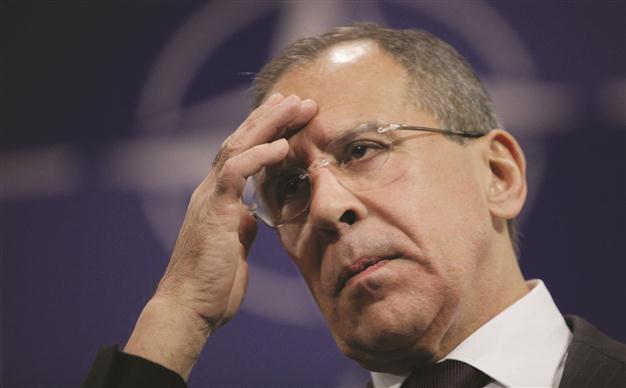No agreement yet on ‘shield’
BRUSSELS

Russian Foreign Minister Sergei Lavrov is seen in this photo. Turkish Foreign Minister Ahmet Davutoğlu and his German and British counterparts (inset) talk during the NATO conference in Brussels. AP photo
ussia and NATO remain deadlocked in a long-running dispute over the alliance’s plan for a missile shield in Europe, officials said yesterday amid Russian warning that time was running out for an agreement.Moscow is seeking legal guarantees that NATO’s planned missile defense system is not aimed at limiting Russia’s strategic nuclear capability and wants joint control of how the system is used.
Moscow has said it will take military counter-measures if necessary. NATO, however, wants separate systems.
“It does not affect our strategic balance with Russia and certainly is not a cause for military counter-measures,” U.S. Secretary of State Hillary Clinton said in regard to the missile defense plan at a meeting of NATO foreign ministers in Brussels. “That said, no ally within NATO is going to give any other country outside the alliance a veto over whether NATO protects itself by building a missile defense system against the threats we perceive are the most salient,” she said.
During a meeting with his NATO counterparts, Russian Foreign Minister Sergei Lavrov repeated his country’s concerns about plans to station elements of the system near Russia in NATO member states Poland, Romania and Turkey. The facilities would include radar with coverage extending into Russian territory.
Russia has threatened to deploy missiles and radar near NATO territory to counter the system if an agreement to cooperate cannot be reached. “They keep repeating not to worry, not to worry, it is not targeted against you,” Lavrov said. “If we are to be treated as a potential strategic partner, we would like people to have respect for our intellectual abilities. “We need legally binding arrangements because good intentions come and go, while military capability is what stays,” he said.
Russia and NATO already have a binding agreement saying they will refrain from the use of force against each other. And both Lavrov and NATO Secretary-General Anders Fogh Rasmussen said the two sides had agreed to strengthen cooperation in other areas, including the fight against terrorism.
In addition, NATO ministers backed Russian proposals to boost cooperation in fighting maritime piracy. Despite the disagreement on missile defense, Rasmussen said NATO still hoped to shape the outline of a pact with Russia by the NATO summit scheduled in Chicago for May 2012. “We do not agree yet,” Rasmussen told reporters. “We all agree it is important to keep on trying to keep on talking, to keep on listening to each other’s concerns,” he said. “If we can agree on this issue it will take our relationship to the next level.”
Lavrov reiterated a demand for guarantees that the system would not target Russia, given the stationing of the shield’s military infrastructure near its territory. “We believe we still have some time to reach a mutually beneficial solution,” he told a news conference. “We still have some time, but time is running out every day.”
Davutoğlu-Clinton meeting
Meanwhile, the Turkish Foreign Minister Ahmet Davutoğlu, who attended the NATO meeting, met Clinton and French Foreign Minister Alain Juppe separately on the sidelines of the meeting. It has been learnt that Davutoğlu and Clinton discussed Syria and the elections in Egypt.
Clinton asked Davutoğlu about the health condition of Prime Minister Recep Tayyip Erdoğan, who continues to recover from intestinal surgery on Nov. 26, and requested that he convey her best wishes to Erdoğan. Davutoğlu also discussed Syria and the latest developments in the Arab world along with Juppe.
















